Running a consulting business involves wearing a lot of hats. One day, you’re focused on client delivery. The next, you’re checking project timelines, chasing follow-ups, or trying to remember which lead still hasn’t signed their proposal. ✍️
It’s a fast-paced environment, and without the right systems in place, things start to fall through the cracks.
The most effective consulting firms smartly rely on customer relationship management (CRM) software to stay organized, proactive, and scalable. And it’s not just to store contact details, but to streamline workflows, automate follow-ups, manage client relationships, and give teams a real-time view of the sales pipeline.
Whether you’re an independent consultant or part of a growing firm, the right CRM helps you do more with less. Less admin, fewer missed touchpoints, and no more guessing what needs attention next. 🙅
Here at Method CRM, we’ve been supporting QuickBooks-based businesses since 2010. Method is loved by business owners in the consulting industry for its real-time, two-way QuickBooks sync; no-code customization; and end-to-end sales automation. 🔄 📈
In this article, you’ll discover:
- The biggest benefits of using CRM software for consulting firms
- The features that matter most for managing clients, tasks, and team members
- How popular CRM platforms like Salesforce, HubSpot, Zoho CRM, and Pipedrive compare
- How Method CRM is purpose-built for consultants who want to automate repetitive work, customize their sales process, and integrate with QuickBooks
If you’re ready to run your consulting business with more clarity, less friction, and smarter systems, you’re in the right place. Discover the best CRM for your business. 💯🚀🎯
Table of Contents
Why your consulting business needs a specialized CRM
Consulting is fast-paced. Clients expect clear communication, quick responses, and consistent results. But without the right tools, even experienced firms struggle to keep up. Missed follow-ups, scattered customer data, and invoicing delays can slow down growth and damage client relationships.
A specialized CRM system gives your consulting business the structure it needs to stay organized, efficient, and client-focused.
The common challenges holding consultants back 🚩
Many consulting firms rely on spreadsheets, email threads, and disconnected apps. This leads to:
- Missed follow-ups due to scattered reminders
- Disorganized client data stored across multiple platforms
- Slow or inaccurate invoicing that impacts cash flow
- No real-time visibility across the team
- Manual admin work that wastes time and increases the chance of errors
These issues don’t just create stress but eventually can lead to lost opportunities and stalled business growth.
How a CRM drives growth 🌱
The right CRM software helps you:
- Automate workflows like follow-up emails, task reminders, and invoicing
- Stay consistent with scheduled follow-ups and lead scoring
- Build stronger client relationships with a full view of every interaction
- Give your team real-time access to tasks, pipeline stages, and customer data
- Forecast with confidence using live dashboards and metrics
- Integrate seamlessly with tools like QuickBooks, Gmail, and email marketing apps
For consulting firms, CRM software is more than a database. It’s a growth tool that improves your sales process, deepens client trust, and helps you scale with fewer errors and more efficiency.
Must-have features in a CRM for consultants
Here are the key features to look for in a CRM system for consultants.
Client and contact management with interaction history 👥
Effective client management means having a full view of every interaction. A strong CRM system logs emails, calls, meetings, and notes in one place, so you and your team members always have the context needed to strengthen client relationships and avoid dropped tasks or miscommunication.
Workflow automation and follow-up tools 🦾
A CRM with workflow automation reduces manual work. From auto-reminders and follow-up emails to assigning leads based on deal stage, automation keeps your pipeline moving. You stay focused on delivering high-value consulting services, rather than managing repetitive tasks.
Document collaboration and knowledge sharing 🗂️
Consultants often share documents across teams and clients. Built-in collaboration tools let you upload and organize files, track approvals, and control access, helping you streamline project communication, optimize your processes, and stay aligned on deliverables.
Real-time dashboards, analytics, and forecasting 📊
Your CRM should offer real-time reporting to track leads, projects, and revenue. With visual dashboards and forecasting, you can spot bottlenecks, monitor your sales pipeline, and make data-driven decisions, all essential for business growth.
Project and invoicing integration 📑
A great CRM supports project management and links directly to invoicing tools like QuickBooks. That means fewer errors and faster billing, especially for multi-phase projects. Integration ensures your consulting business runs efficiently from proposal to payment.
User-friendly interface and mobile access 📱
Your CRM should be intuitive and adapt to any screen size, no matter what device you’re using. Look for custom fields, pre-built templates, and a clean interface that fits your sales process. The easier your CRM is to use, the easier adoption will be across your firm.
Consulting-specific vs. general-purpose CRM
The right CRM software for your consulting business isn’t always going to be a popular brand. It’s more important to find a tool that fits your workflow, budget, and growth goals. The two main options are consulting-specific CRMs and general-purpose CRM platforms. Each has its strengths, and understanding the difference can help you make the right decision for your business.
Let’s explore both.
Advantages of consulting-specific CRMs ✅
Consulting-focused CRMs are designed with your unique needs in mind. These platforms support every step, from the first client interaction to project delivery and invoicing.
Here’s what makes them appealing:
- Faster setup: You won’t need to spend hours reconfiguring default modules or creating custom fields. Many consulting CRMs come with pre-built templates tailored to common consulting services like project planning, proposal management, and client onboarding.
- Tailored workflows: These systems often include automation and workflows that align with consulting firms’ sales cycles and delivery models. For example, task reminders linked to discovery calls or automated follow-up schedules after sending a proposal.
- Relevant terminology: Instead of generic labels like “deal” or “ticket,” you’ll see terms like “project,” “engagement,” or “retainer.” Familiar terms improve clarity for your team and speed up adoption.
- Better alignment with project work: Many consulting CRMs integrate project management tools right into the CRM interface, allowing you to track milestones, deadlines, and deliverables alongside client communication.
A consulting-specific platform is often the better fit for firms that want a CRM that feels familiar, focused, and ready to go from day one.
Benefits of general-purpose CRMs ✅
On the other hand, general-purpose CRMs are built for broad application across multiple industries. While they may not speak the consulting language out of the box, they offer a high degree of flexibility.
Some key benefits include:
- Broader integrations: These CRMs typically offer a large library of native and third-party integrations, connecting with everything from email marketing tools to finance software to social media platforms. If your firm relies on a variety of software, this can help streamline your tech stack.
- Scalability: As your firm grows, these CRMs can scale with you. Adding new team members, opening additional offices, or diversifying your consulting services? General CRMs offer enterprise-level performance and support.
- Flexible pricing tiers: General CRMs often come with multiple pricing options to suit startups, small businesses, and large firms. This makes it easier to find a plan that fits your current budget while allowing room for future upgrades.
- Powerful customization: Although setup can take longer, these platforms allow detailed configuration using custom fields, automation rules, and role-based access controls. This is ideal for firms with complex or evolving business processes.
If your consulting business has very specific tech requirements or is planning rapid growth, a general-purpose CRM might be the right foundation.
Which one suits your firm? 🤔
The choice between a consulting-specific CRM and a general-purpose CRM should come down to your business needs, team size, and how much time and technical skill you have for setup.
Ask yourself:
- Do we need a CRM we can start using quickly, with minimal onboarding or customization?
- Do we want industry-specific features like project-linked contacts or client-facing portals?
- Do we plan to grow rapidly and need enterprise-grade CRM functionality and integrations?
- Is our team comfortable configuring and maintaining a more complex CRM system, or would we benefit from something more out of the box?
For many independent consultants and small firms, a consulting-specific CRM delivers everything needed in a more focused, accessible package. But for consulting companies managing large teams, intricate reporting, or multi-channel marketing campaigns, a general-purpose platform may offer the depth and flexibility required.
Ultimately, the right CRM helps you stay connected to your clients, manage your pipeline efficiently, and support your long-term business growth goals.
Top CRM options for consultants in 2026 🥇
Picking the right CRM can often feel like finding a needle in a haystack with all the options out there. Luckily, we’ve handpicked a few options for you to make your choice easier.
Here are the top CRM tools consultants trust in 2026.
Method CRM
Best for automation, customization, and QuickBooks integration.
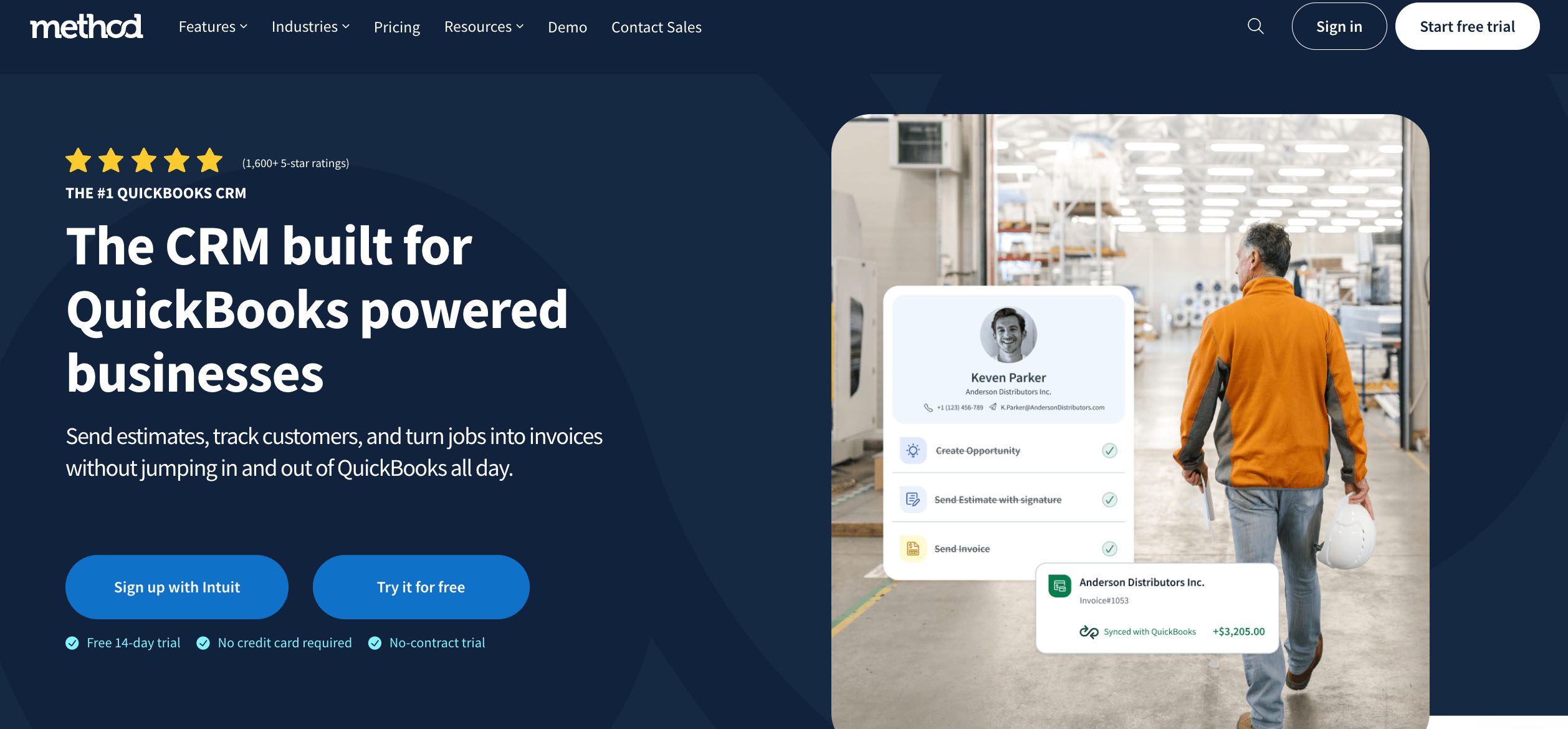
Method CRM stands out for its deep QuickBooks sync and powerful workflow automation. You can manage lead capture, proposals, project tracking, and invoicing in one place without tech complexity. Its flexibility allows you to build a CRM system around your unique consulting workflows, helping you stay on top of follow-ups and pipeline management.
Ideal for consultants who want the benefits of automation, lead management and customization, without managing a complex IT setup.
Starting price: Contact management plan is $27/user/month (billed annually)
4Degrees
Strong for relationship-focused consulting firms.
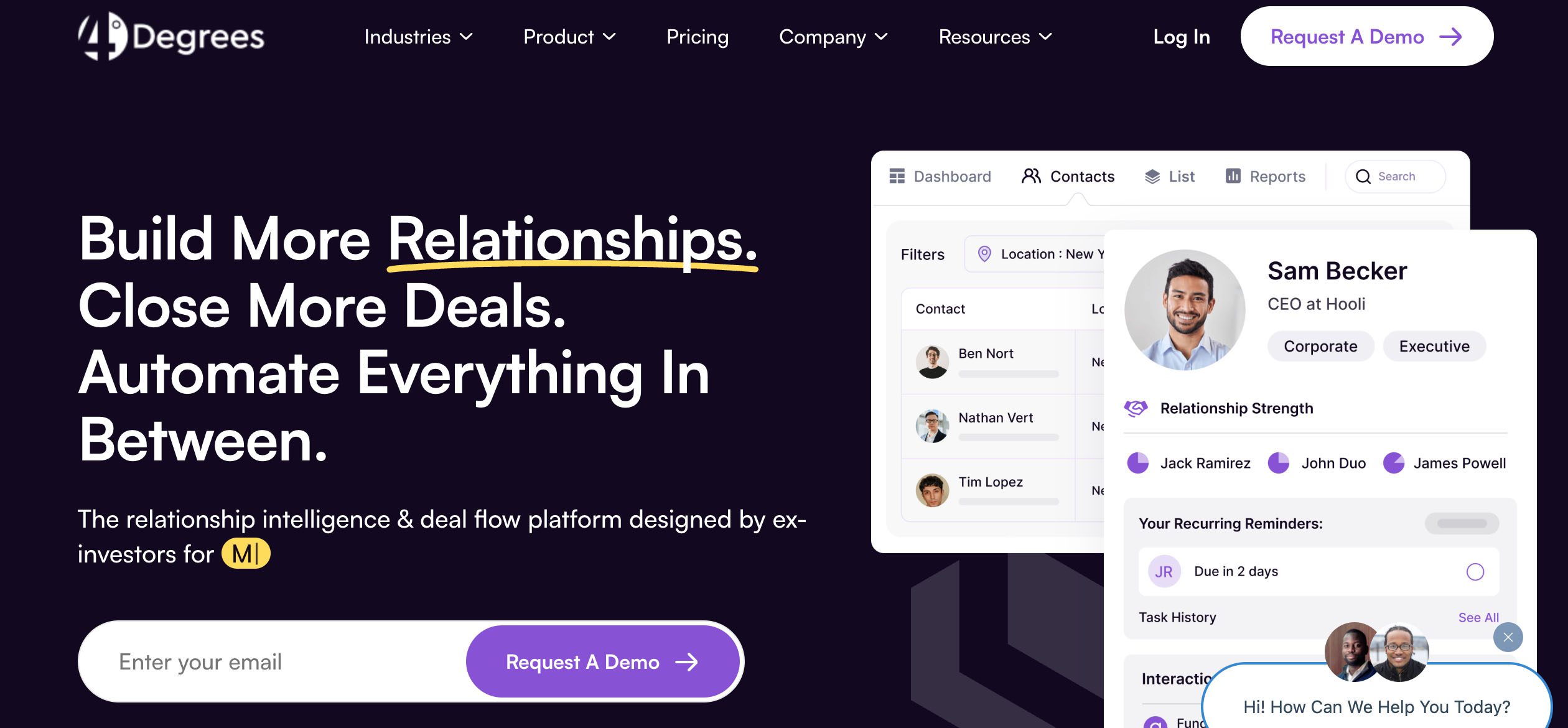
Built for networking-heavy fields like executive search and venture capital, 4Degrees tracks relationship data and suggests timely follow-ups. It works well for boutique firms that grow through referrals and client interactions.
Starting price: Pricing available upon request
Zoho CRM
Flexible and affordable for tech-savvy teams.
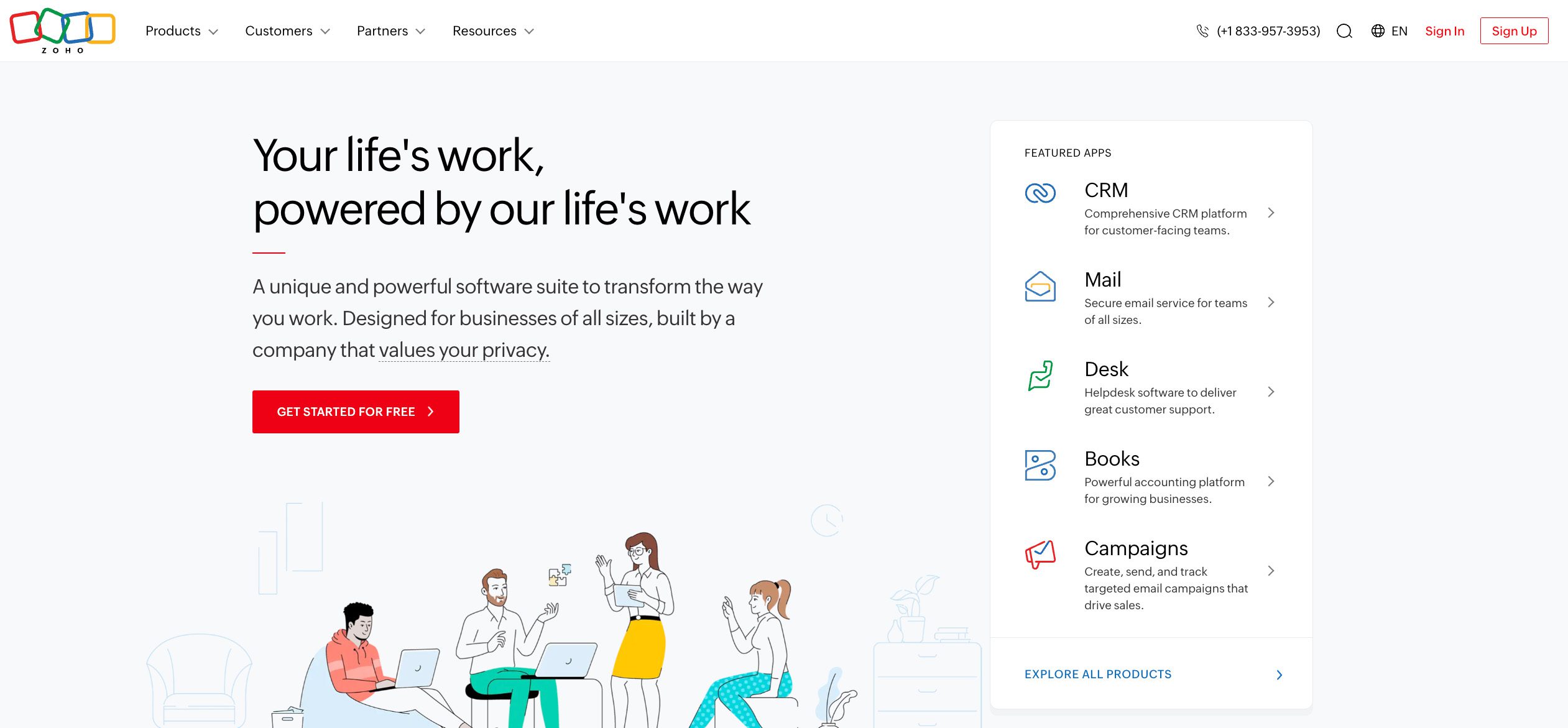
Zoho CRM is known for its broad functionality and includes key features at a competitive price. You get access to email marketing tools, quoting, invoicing, and social media integration. However, its learning curve means it suits consulting firms with strong tech confidence.
Starting price: Free plan available for up to three users. Paid plans start at $14/user/month (billed annually)
HubSpot
Great for firms focused on marketing automation.

HubSpot combines ease of use with robust email campaigns, email templates, landing pages, and lead generation tools. It also offers sales pipeline and service desk capabilities. While it excels in marketing, some consultants may find its broader toolkit unnecessary if their focus is service delivery.
Starting price: A free plan is available for up to 2 users. Starter Customer Platform with only the essentials at $9 per user/month (billed annually). Most scaling businesses start with the Professional Customer Platform ($1,300/month for 6 users) or the Enterprise Customer Platform ($4,700/month for 8 users).
Learn more about HubSpot pricing and whether it’s the right fit for your business.
Salesforce
Highly scalable but complex.

Salesforce is one of the most powerful CRM platforms on the market. With advanced forecasting, reporting, and integrations, it primarily supports enterprise-level consulting firms. That said, smaller teams may find it too technical or costly to manage without dedicated support.
Starting price: Salesforce Starter Suite starts at $25 per user/month (billed annually), but is only available for up to 5 users. Beyond that, you’ll need the Pro Suite at $100 per user/month.
Scoro
All-in-one platform for service firms.
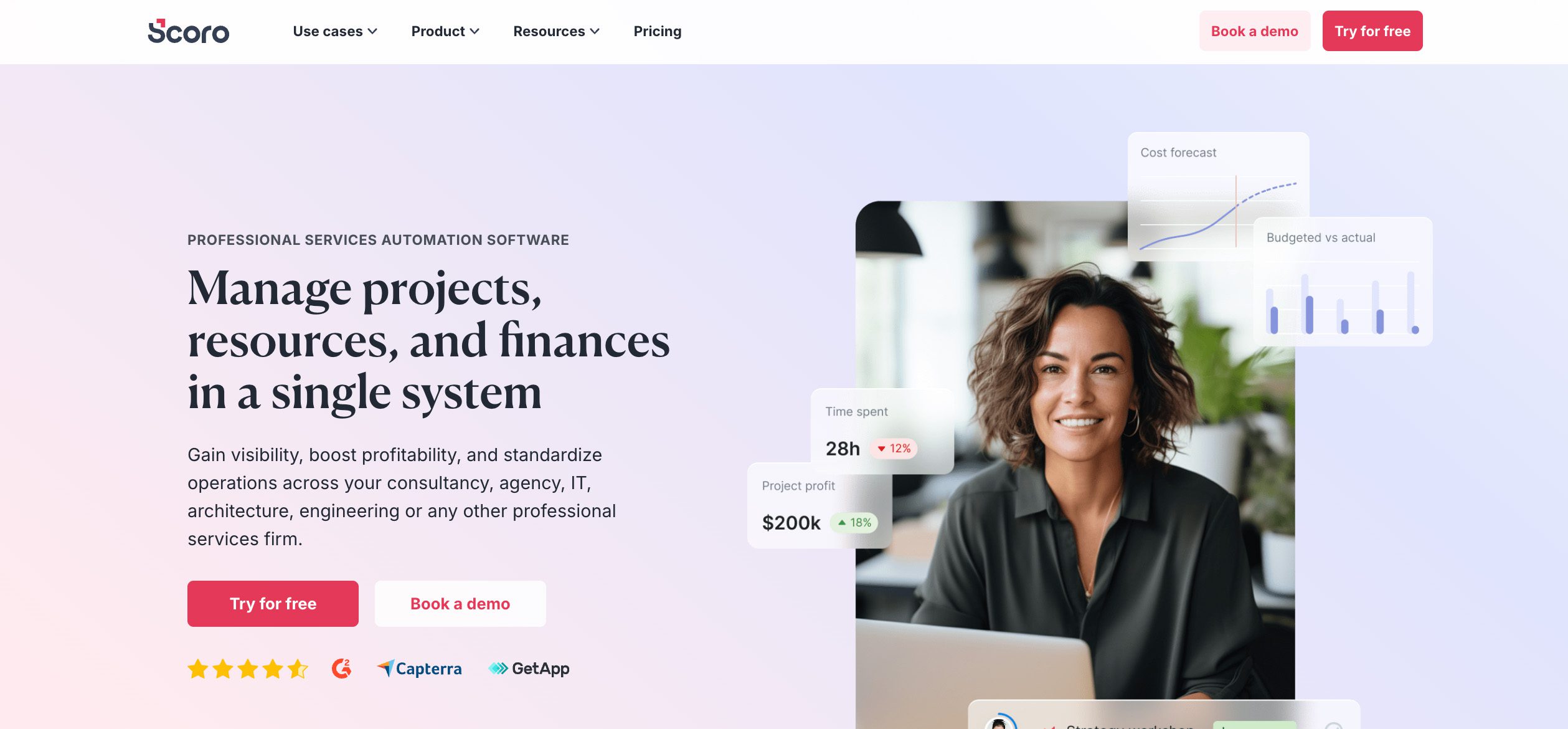
Scoro blends CRM functionality with quoting, project management, task management, time tracking, and billing. It’s a strong choice for consulting firms looking to streamline project and finance operations in one workspace.
Starting price: Core plan is $19.90/user/month (billed annually)
Insightly
Convenient for Google Workspace users.

Insightly offers core CRM features with simple pipeline automation and project tracking. Its seamless integration with Gmail makes it a go-to for small consulting businesses using G Suite.
Starting price: Plus plan is $29/user/month (billed annually)
Workbooks
Supportive onboarding and visibility for mid-sized teams.
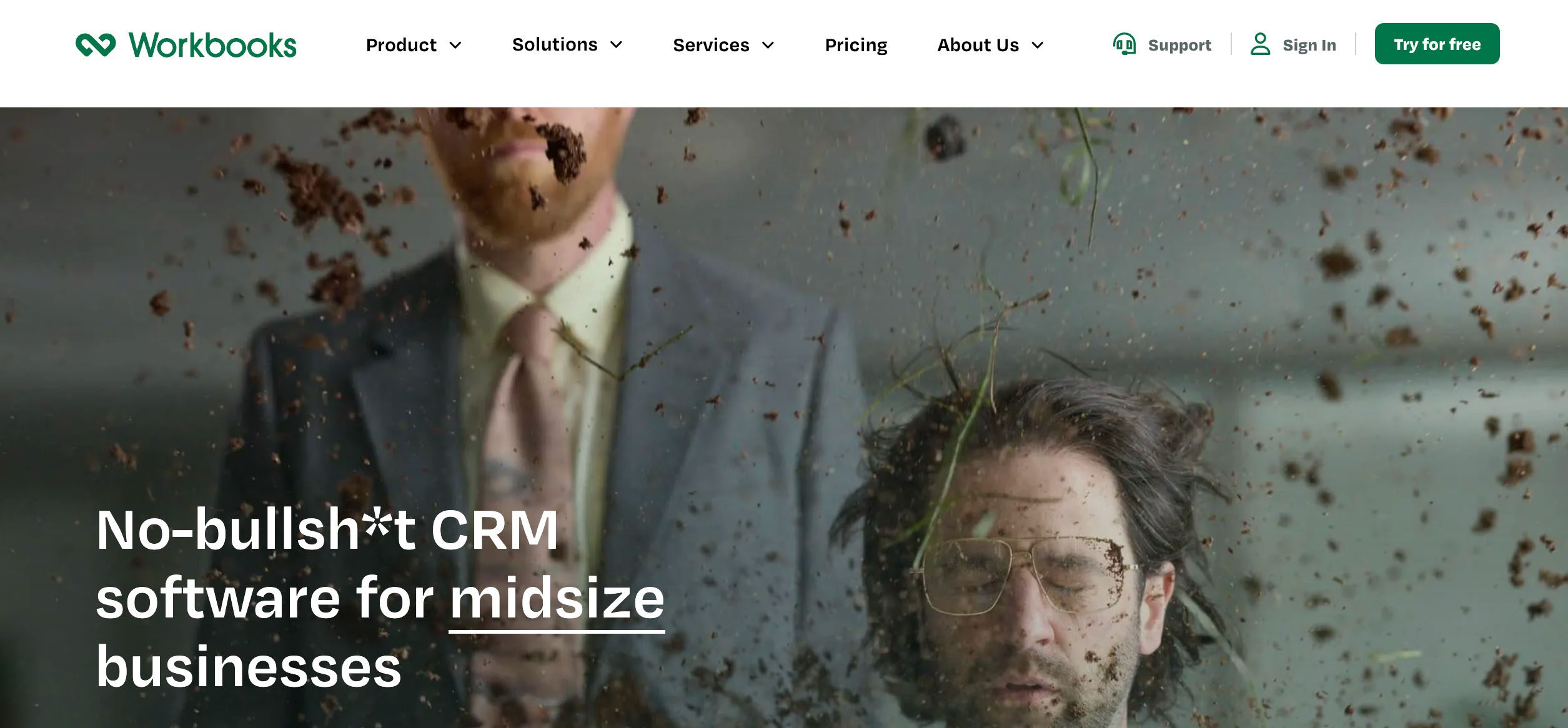
Workbooks balances functionality and ease of use. It covers sales, marketing, and contact management, with strong onboarding support.
Starting price: $45/user/month
Each CRM solution above serves different business needs. But if you’re looking for a CRM that puts consultants first, offering automation, intuitive workflows, and QuickBooks integration, Method CRM is a clear frontrunner.
How to evaluate and compare CRM options
With so many platforms offering similar features, it’s likely you’ll be making plenty of comparisons. Instead of going off gut feeling, it helps to use a structured way to compare tools before making a decision.
Here’s a practical evaluation framework to guide your selection process, whether you’re shortlisting two CRMs solely for customer support or considering the full landscape.
CRM comparison checklist 📋
Use the following checklist to evaluate each CRM you’re considering. These five categories represent the most important decision-making criteria for consultants.
- Ease of use
- Is the interface intuitive?
- Can your team adopt it quickly with minimal training?
- Is the mobile app easy to navigate?
- Automation capabilities
- Can you automate task reminders, follow-ups, or lead handoffs?
- Does the platform offer sales automation to reduce admin work?
- How flexible is the automation builder?
- Workflow alignment
- Does the CRM support the way your firm works today?
- Can it mirror your proposal, onboarding, and invoicing flow?
- Are there ready-made templates for consulting services?
- Integrations and reporting
- Does it integrate with your accounting platform (like QuickBooks)?
- Can you sync contacts, projects, invoices, and payment statuses?
- Are real-time reports and dashboards included?
- Pricing and ROI
- Are the pricing tiers transparent?
- Do you pay for features you actually need?
- What support is included with your plan?
CRM evaluation snapshot ⭐
Here’s a simplified scoring table to help you visualize how popular CRMs stack up across these five categories. Scores range from ★ (limited) to ★★★★★ (excellent), based on commonly reported user experiences and platform capabilities.
CRM | Ease of Use | Automation | Workflow Fit | Integrations & Reporting | Pricing / ROI |
| Method CRM | ★★★★☆ | ★★★★★ | ★★★★★ | ★★★★☆ | ★★★★★ |
| HubSpot | ★★★★☆ | ★★★★☆ | ★★★☆☆ | ★★★★☆ | ★★★☆☆ |
| Zoho CRM | ★★★☆☆ | ★★★★☆ | ★★★★☆ | ★★★★☆ | ★★★★☆ |
| Salesforce | ★★★☆☆ | ★★★★★ | ★★★★★ | ★★★★★ | ★★★☆☆ |
| Insightly | ★★★★☆ | ★★★☆☆ | ★★★☆☆ | ★★★☆☆ | ★★★★☆ |
| Scoro | ★★★☆☆ | ★★★★☆ | ★★★★☆ | ★★★★☆ | ★★★☆☆ |
| Workbooks | ★★★★☆ | ★★★★☆ | ★★★★☆ | ★★★★☆ | ★★★★☆ |
| 4Degrees | ★★★★☆ | ★★★☆☆ | ★★☆☆☆ | ★★★☆☆ | ★★★☆☆ |
Why Method CRM is tailored for consultants 🧩
Method CRM was built with small businesses and consultants in mind. Here’s how it meets five key criteria:
- Ease of use: The interface is clean, easy to navigate, and doesn’t require a steep learning curve. For businesses seeking complex customizations, Method offers expert-led customization services.
- Automation: Users can automate anything, including scheduling client follow-ups and triggering invoice creation once a deal is closed. Method lets you automate each step of your consulting workflow so you can reduce manual work and ensure nothing slips through the cracks.
- Workflow alignment: Method is one of the few CRMs that adapts fully to your workflow instead of forcing you into a fixed system. You can customize every field, stage, and process, which is ideal for firms that offer unique or high-touch services.
- Integrations and reporting: Its two-way QuickBooks sync helps keep your contacts, estimates, invoices, and payments up to date. Real-time reports and dashboards give you a clear view of your sales pipeline and revenue projections.
- Pricing and ROI: Method is priced to deliver value, especially when you factor in how much admin time you save through automation. Their onboarding support also helps you get up and running without paying for consultants or outside help.
How to use this framework
When comparing CRMs, try scoring each option from one to five in the categories above based on your own business needs. Involve team members if possible, especially your salespeople or those handling daily client communications. The CRM you choose should serve the whole team, not just the person buying the software.
A CRM that feels slightly more expensive at first might actually deliver more value if it helps you:
- Close deals faster
- Automate routine tasks
- Improve client retention
- Eliminate invoicing delays
- Reduce back-and-forth across tools
In the next section, we’ll discuss how to set up a consulting CRM and the onboarding steps to expect.
Getting started with your CRM: A quick roadmap 🗺️
Setting up your CRM software does not have to be complicated. With the right steps, you can start streamlining your consulting business right away. Here’s a simple guide to get your system up and running.
1. Define your sales pipeline
Map out the key stages in your sales process, from initial lead to invoicing. Your CRM system should reflect these stages clearly. In Method CRM, you can easily customize your pipeline to match your consulting services.
2. Automate your workflow
Use automation to simplify repetitive tasks. For example, set up automatic reminders after client meetings or when proposals are sent. That way, your follow-up stays consistent and you reduce manual work.
3. Build templates
Create email, invoice, and task templates to keep communication efficient and professional. These tools help independent consultants deliver a reliable and polished experience to every client.
4. Track key metrics
Monitor your pipeline value, conversion rates, and follow-up activity using your CRM reporting dashboard. With real-time data, you can make better decisions and improve your process over time.
5. Review and refine
Check in regularly to see what is working. Are your automations doing their job? Are follow-ups being missed? Making small improvements can lead to stronger results and better client relationships.
Conclusion 💡
A CRM designed for consultants can transform the way you work. It supports stronger client relationships, more efficient operations, and better profitability, all while saving you time.
If you are ready to move past spreadsheets and manual processes, try Method CRM. It brings automation, consulting-focused workflows, and QuickBooks integration into one simple platform.
Start your free trial or book a demo to see how Method CRM can help you run your consulting business with more clarity, confidence, and control. 😎👌🔥






